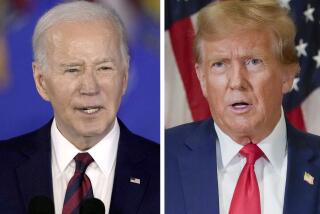Public Worry About Higher Costs Growing, Poll Finds
- Share via
WASHINGTON — Despite a continuing economic recovery, Americans are increasingly anxious about their ability to afford health care, college tuition and retirement, according to a nationwide survey released Monday.
The growing personal anxiety is accompanied by declining support for Republican policies in Congress and a consolidation of Democratic voters behind President Clinton, the poll found.
Thus, slightly less than a year before the 1996 presidential election, the public appears to be signaling the GOP to slow its drive to reform Medicare and to balance the federal budget if it means higher costs for American families, according to a telephone survey of 2,000 adults conducted in late October by the Times Mirror Center for the People & the Press.
Danger signs for the Republicans are coming especially strongly from independent voters: Only one in five self-described independents approves of the GOP agenda. Even among usually reliable Republican voters, there are misgivings about Republican policies in Congress. Only two-thirds of Republicans approve of the party’s current performance.
The news is better for the President: Nearly four of five Democratic voters approve of Clinton’s performance, although his job rating among all Americans remains stuck at just below 50%.
Overall, nearly three out of four Americans are unhappy with the direction of the country, the Times Mirror survey found.
“One of the most striking findings is the extent to which President Clinton escapes blame for the public’s dissatisfaction,” said Andrew Kohut, the center’s director. “Only 7% blame him for what’s wrong. He looks better today because he’s not one of those Republicans in Congress.”
The findings on growing economic insecurity and public anxiety with congressional priorities parallel those of a Los Angeles Times poll released last week.
The Times Mirror poll released Monday found that the chief sources of discontent among the public are the rising cost of health care, an economy in which overall recovery is not translating into higher wages, crime, a political system seen as broken and too-high taxes.
Two-thirds of respondents reported being “very concerned” about being able to afford health care for a family member, a 16-percentage-point increase since March, 1994. Almost half (48%) are worried about not having enough money for retirement. And 44% said they feared they would not be able to afford college tuition for their children.
The blame for the nation’s problems falls chiefly on Congress, cited by 35% of respondents, and on “the people themselves,” named by 27%.
As a result, the number of people saying they intend to vote for a Democrat for Congress has risen to 48% from 43% in August. Those preferring a Republican congressional candidate has dropped to 48% from 50% two months ago.
Among Republican candidates for President, only Senate Majority Leader Bob Dole (R-Kan.) is broadly acceptable to traditional GOP voters. But Dole’s support among independents is lukewarm, and his acceptability to Republicans is not nearly so deep as Clinton’s is among Democratic voters, who say they are likely to vote for his reelection by 8-1 or 9-1 margins.
The one political figure who is acceptable across the board is retired Gen. Colin L. Powell, who announced last week that he would not seek the presidency.
The poll found little evidence that either party has gained converts. In fact, interest in a third party continues to grow--those favoring such alternatives has increased from 53% in July, 1994, to 59% in the new poll.
The poll found growing unhappiness with business.
The percentage of Americans holding an unfavorable opinion of business has risen to 36%, up from 24% last year.
Only 4% of the poll’s respondents said corporations put the interests of their employees first.
The poll’s margin of error is plus or minus two percentage points.
More to Read
Get the L.A. Times Politics newsletter
Deeply reported insights into legislation, politics and policy from Sacramento, Washington and beyond. In your inbox twice per week.
You may occasionally receive promotional content from the Los Angeles Times.










